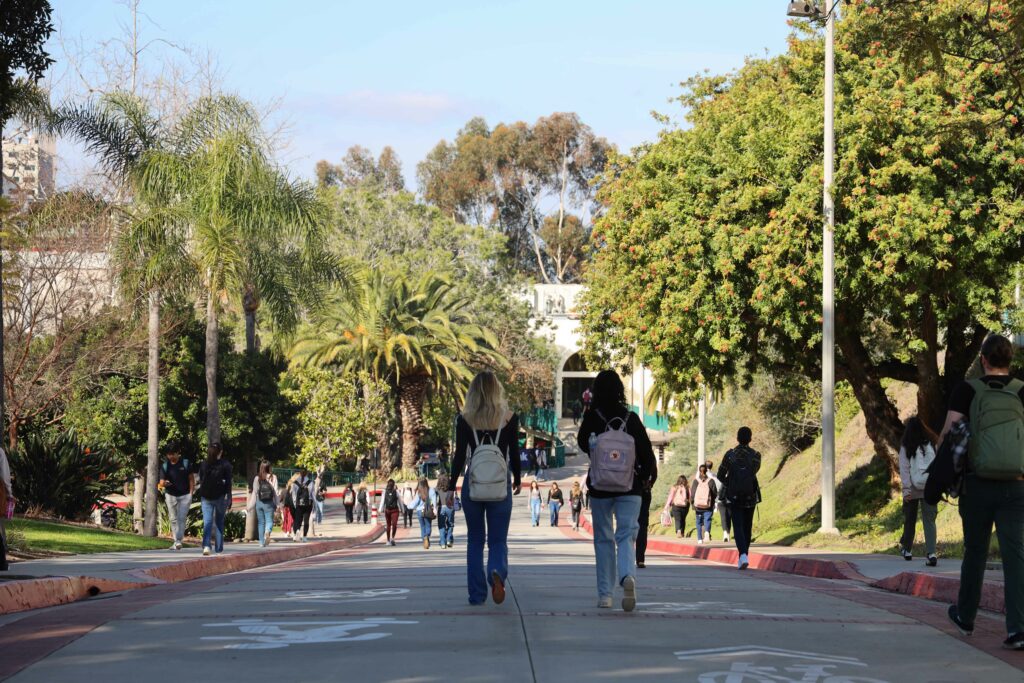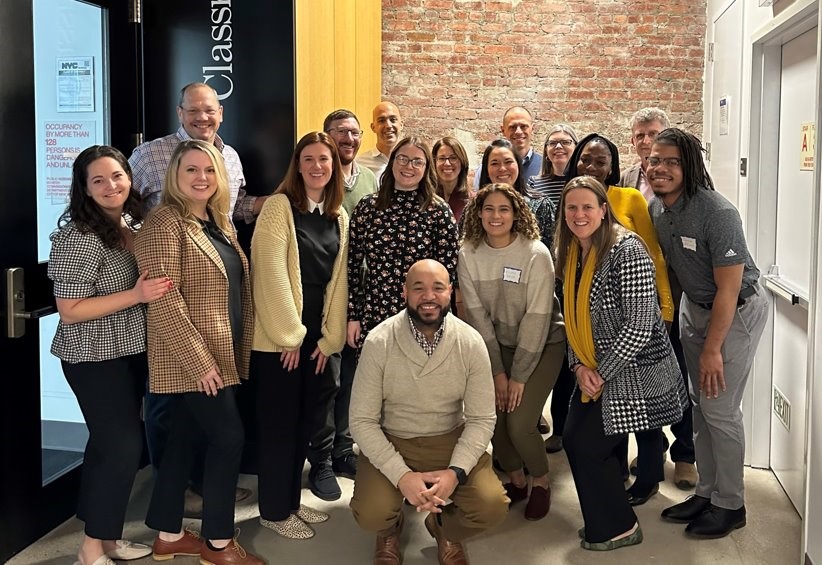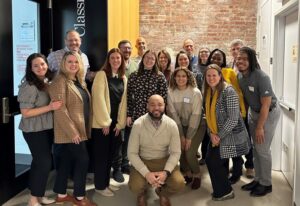
San Diego State University, Hilltop Way.
Credit: Jazlyn Dieguez / EdSource
As we honor the dedication and love of father figures this June, it’s critical to spotlight a demographic in urgent need of support: student parents. Between balancing coursework with child care, these parents are pursuing better opportunities for themselves and creating a foundation to uplift their families. And they are doing so while facing dubious odds as they navigate a higher education system built without their unique needs in mind.
More than one-fifth of undergraduate students in the U.S. — about 3.7 million — are parents. However, only 37% of student parents graduate within six years, compared with nearly 60% of their peers without children.
In California, the proposed GAINS for Student Parents Act (Assembly Bill 2458) aims to address this disparity. The bill would adjust student parents’ cost of attendance to account for child care and improve data collection on student parents — two vital pieces of the puzzle for identifying and addressing the unique hurdles faced by students with children.
I recently spoke with a student parent on the cusp of graduation about his experience. Larry, 40, is raising nine children, six of whom are still at home. That’s a heroic feat for any father, but Larry also graduated from CSU Bakersfield with degrees in sociology and communications just in time for Father’s Day this year. His story, while inspiring, highlights systemic issues in higher education that make success stories like his much too rare.
Larry sits at the intersection of many identities: father, veteran and previously incarcerated. Through these identities, he has experienced bias, stigma, and barriers to opportunities that others on campus take for granted. His experience is not unique. A national survey found that 40% of parenting students feel isolated on campus, and 20% feel unwelcome.
“My children have dealt with a lot. I’ll have my kids on campus while I’m in class, but since I’m older, people think I should have things figured out. If there was someplace for them to be or something for them to do while they were on campus — what am I supposed to do when I don’t have child care?” Larry said.
According to a New America survey, nearly 40% of student parents who stopped out of college cited caregiving and school work as significant reasons. However, the number of colleges with accessible on-campus child care has declined. When it does exist, long waiting lists and high costs are serious barriers. This exacerbates time poverty, forcing student parents to make sacrifices that impact their academic outcomes and their children’s future opportunities. Passing the GAINS for Student Parents Act is critical to addressing these hurdles.
California has made strides with legislation like AB 2881, passed in 2022, granting student parents priority class registration to accommodate their demanding schedules. But there is still much room for improvement.
The GAINS for Student Parents Act can help create an education system that uplifts families. The bill aims to standardize the financial aid process across institutions, making automatic adjustments to the cost of attendance for student parents, who are often first-generation students of color facing additional financial burdens not covered by existing aid programs. Since colleges and universities currently lack a systematic approach to identifying student parents, the bill would also improve the collection of data to facilitate more targeted support for these students.
Co-sponsored by the Michelson Center for Public Policy, along with The California Alliance for Student Parent Success, Cal State Student Association, Generation Hope, and uAspire, this bill made it out of the Assembly and moved on to the Senate where it was passed in the Senate Higher Education Committee. It is now waiting to be heard in Senate Appropriations.
When asked about graduation, Larry said: “I didn’t think I was going to finish this. I’m blown away. I’m graduating with a degree — what is that? A college degree!”
Father’s Day graduation success stories like Larry’s should be more common and less fraught with tribulations. Student parents are resilient and strive to do what is best for their children. But as policymakers, leaders, administrators and practitioners, how can we build a more equitable system for parenting college students nationwide?
By supporting student-parent success, we ensure the success of their children and future generations. So, this Father’s Day, how will you join the movement to ensure every student father and every student parent has the support they need to succeed?
•••
Queena Hoang is the senior program manager for Michelson 20MM Foundation’s Student Basic Needs Initiative. The initiative aims to tackle the real cost of college, especially the nontuition costs that place students in positions of housing insecurity, homelessness, food insecurity, and overall financial instability.
The opinions expressed in this commentary represent those of the author. EdSource welcomes commentaries representing diverse points of view. If you would like to submit a commentary, please review our guidelines and contact us.






